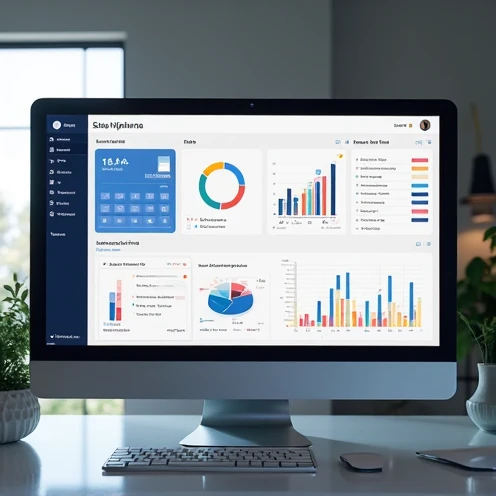Best Lead Management Software – The Heart of a High-Performance CRM Strategy
Every modern business, whether small or large, is powered by relationships. At the center of those relationships is CRM—Customer Relationship Management. CRM software helps businesses connect with customers, understand their behavior, and deliver personalized experiences. It simplifies how leads are managed and ensures no opportunity is missed. But even the best lead Management Software CRM system is only as good as its lead handling. That’s where the Best Lead Management Software comes in. It brings structure to chaos, streamlines the journey from prospect to customer, and empowers sales teams to work smarter.
What Exactly is CRM and Why Does It Matter?
Iklan Google AdSense
CRM, short for Customer Relationship Management, is more than a digital contact book. It acts as a central hub where all your customer interactions are tracked. From email conversations to sales calls, CRM systems store everything in one place.
With CRM, businesses gain visibility across the customer lifecycle. It helps teams understand what a lead needs, when to reach out, and how to provide value. The result? Stronger relationships, higher conversions, and happier customers.
Iklan Google AdSense
Why Lead Management is the Core of Sales Growth
Lead management is the process of capturing, tracking, and nurturing potential customers. Without a system in place, leads can slip through the cracks—especially when volumes grow.
An effective lead management system sorts leads by priority, tracks their engagement, and assigns them to the right team members. With the Best Lead Management Software, your team doesn’t just react—they act with precision.
Essential Features That Make Lead Software Stand Out
The right software goes beyond storing contacts. Look for platforms with automated lead scoring, real-time tracking, and customizable pipelines. These features help your team focus on high-value opportunities.
Integration is also key. A lead management tool that connects with your email, website, and marketing tools ensures smooth data flow. This creates a seamless user experience and enables real-time decisions.
From Manual Spreadsheets to Smart CRM: A Necessary Upgrade
Many businesses still rely on spreadsheets for lead tracking. While that might work at the beginning, it quickly becomes inefficient. Manual data entry invites errors, and follow-ups get missed.
Shifting to CRM is like upgrading from a paper map to GPS. It’s faster, more accurate, and less stressful. With automatic alerts, task assignments, and analytics, CRM allows your business to grow without losing control.
How CRM Nurtures Leads from Cold to Closed
Once a lead enters your system, the job isn’t done—it’s just beginning. Lead nurturing involves building trust through timely and relevant communication. CRM platforms allow you to schedule emails, trigger reminders, and deliver content based on behavior.
Segmentation tools let you group leads by interest, source, or readiness to buy. This helps you send the right message at the right time, making your outreach far more effective.
Automating Workflows: Save Time and Close More Deals
Manual tasks can drain time and energy. CRM automation takes care of repetitive actions so your team can focus on selling. For instance, when a lead fills a form, the CRM can assign it to a sales rep, send a thank-you email, and update the sales pipeline.
This level of automation boosts efficiency and improves consistency. Small businesses especially benefit from this, as it lets them operate at a higher level without needing a large team.
Connecting CRM with Your Marketing Stack
A great CRM doesn’t work alone. It should connect with your marketing stack—like email platforms, landing pages, and ad tools. This integration bridges the gap between marketing and sales.
With shared data, both teams can align their efforts. Marketers can see which campaigns drive qualified leads, while sales can follow up with context. That’s how you build a lead engine that never stops running.
Real-World Examples: Who Needs Lead Management Software?
Every industry benefits from better lead management. Real estate agents track property inquiries. Education consultants manage student leads. Insurance brokers follow up on policy quotes.
E-commerce stores use CRM to re-target abandoned carts. B2B companies track complex deal cycles involving multiple stakeholders. In short, if you interact with customers, you need CRM.
Metrics That Prove CRM’s Value
Want to know if your CRM is working? Check the numbers. Key metrics include conversion rates, time to close, and response time. CRM systems help you track performance at every step.
You can also monitor team productivity, lead source effectiveness, and pipeline bottlenecks. With visual dashboards, decision-makers get clear insights, allowing faster adjustments and smarter strategies.
Choosing the Best CRM for Your Business
There’s no one-size-fits-all solution. The Best Lead Management Software for your company depends on your needs. Look for scalability, customization options, and ease of use. Try demos and read reviews to evaluate real-world usability.
It’s also important to choose software that matches your team’s workflow. A complex tool no one uses is less effective than a simple tool everyone loves.
CRM Is Your Growth Engine
CRM isn’t a luxury—it’s a necessity in today’s customer-centric world. With it, businesses save time, stay organized, and serve better. But to fully unlock its potential, you need the Best Lead Management Software as your foundation.
When leads are managed with care and strategy, sales don’t just happen—they soar. CRM turns cold data into warm relationships, and that’s the ultimate key to sustainable growth.
Iklan Bersponsor Google






